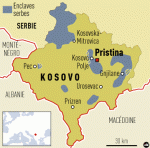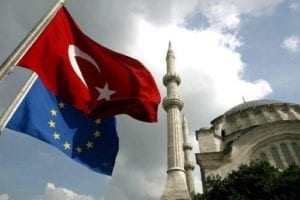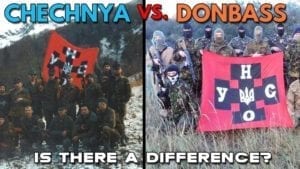 A translation of an article/communique by Synergies Européennes which places the the Serbs’ struggle against national fragmentation in its wider European historical context.
A translation of an article/communique by Synergies Européennes which places the the Serbs’ struggle against national fragmentation in its wider European historical context.Reflections on Kosovo’s Unilateral Declaration of Independence
The question arises as to whether or not to recognize Kosovo’s independence. To put it differently: Can one recognize the right of a population represented by a provincial parliament to declare its independence if most of its representatives are in favor of such a step?
Two principles are involved in this inquiry:
1) The right of peoples to arrange their own affairs, the full right of identity, based on objective criteria and concrete foundations (ethnic, linguistic, historical, etc.), the right of peoples to furnish themselves with their own system of political representation within a given spatio-temporal framework, whether within the framework of a multi-ethnic state (as in the Swiss model) or within a state which envisions a more or less extensive federalism based on alternative models, such as German federalism or the country of autonomous communities that is present-day Spain. Does this right to autonomy confer the right to independence? As regards the European context, this question can be debated.
2) The right of European peoples to refuse any Balkanization which weakens the continent as a whole, creating in its midst conflicts which can be exploited by third-party powers foreign to the European continent (in the terminology of Carl Schmitt, “territorially-alien powers” – raumfremde Mächte).
The first of these principles is a principle of rights; the second, of geopolitics. Kosovo’s unilateral declaration of independence presents a contradiction: because it is unilateral it pits rights against geopolitics, whereas in Europe rights and geopolitics aren’t supposed to be at odds but are supposed to form, together, an indissoluble unit. Rights should help consolidate the territorial whole, barring the door to all efforts at disruption, and not acquiesce in actions having weakening and fragmentation as their effects.
The first of these principles is a principle of rights; the second, of geopolitics. Kosovo’s unilateral declaration of independence presents a contradiction: because it is unilateral it pits rights against geopolitics, whereas in Europe rights and geopolitics aren’t supposed to be at odds but are supposed to form, together, an indissoluble unit. Rights should help consolidate the territorial whole, barring the door to all efforts at disruption, and not acquiesce in actions having weakening and fragmentation as their effects.
The right of autonomy, even the most extensive possible, indeed the right to national independence, is inalienable from the point of view once expressed by Herder, philosopher-defender of population identities in the Germanic world as well as in the Balkans where he had lots of followers. However, this complicated dialectical game between, on the one hand, particular local identity and, on the other, the need to provide a solid framework in which all of these particular local identities can flourish in peace and harmony entails building, all together, a common European framework drawn, sometimes tragically, from the life experiences of the peoples of Europe down through the centuries. This common framework ought to be the contemporary embodiment of an initial common unity which first took wing in a central European land at prehistory’s close according to the claims of proto-history. The ethno-historical European fact spread from a beginning at the center, mainly high Danubian (land of the Michelsberg cultures, followed by the La Tène and Hallstatt civilizations) which then spread into the Balkans along the shores of that great river (Lipinski-Vir culture, Starcevo culture, etc.). The Balkans are ours if they are our immediate Ergänzungsraum [the French text uses this German word which means something like “land of fulfillment”], our springboard to the eastern Mediterranean, Egypt, Anatolia, and the Fertile Crescent.
This right of autonomy is certainly a right but only for whoever fully recognizes the primordial unity of our peoples before their spread into their vast peripheries.
Neither Albanity nor Hellenity, Celticity, or Itality [Prof. Steuckers coins those four words; they’re not French] are exempt from this rule. Therefore we fully recognize the principle of a European Albanity extending southward as well as toward the eastern Mediterranean and toward Egypt (Mehmet Ali was of Albanian origin). But Kosovo, since becoming Moslem following the Ottoman conquest, is no longer this Albanity capable of projecting itself thus southward and thus eastward, enlarging the ager europeus [“European territory”]. It’s treason against the spirit of the great hero Skanderbeg, captain against the Ottomans in the XVth Century Adriatic at the doors of the eastern Mediterranean. By becoming Ottoman and Moslem, Albanity turns its forces against Europe’s center, spearheading two geopolitical directions which are alien to Europe, therefore Europe’s enemies: the direction of the Turkic-Mongol peoples (arising in Mongolia, extending toward the Hungarian steppe and the Adriatic) and the direction of the Hamito-Semitic peoples (arising on the Arabian Peninsula, extending thence in every direction).
An independent Kosovo would be the third Moslem Balkan state after Albania and Bosnia. Together with them it would constitute a pantouranian [a word referring to the peoples of Turkic central Asia] (Turkic-Mongol) and Arabo-Moslem (Hamito-Semitic) vanguard right in the middle of a region that has always been Europe’s springboard to its eastern Mediterranean and Egyptian periphery. A Europe blocked in this precise Balkan region would no longer have a real opening on the world and would be condemned to remain in place and implode. One must remember the pre-Hellenistic peoples who would create the glory of ancient Greece: they passed first through the Balkans, including Philip’s and Alexander’s Macedonians. One must remember Rome, which was obliged to completely subjugate the Balkans before going on the offensive in Asia minor and imposing its will on Egypt. Europe cannot tolerate a foreign body in this highly strategic region. Any foreign body, that is, any entity seeing itself as belonging to groups that do not respect traditional European geopolitical directions, hinders our continent’s development, present and future. For our leaders to acquiesce in such a weakening is unforgivable given the worldwide struggles taking shape in this dawn of the XXIst Century.
In the quarrels that have animated the small circle of Parisian intellectuals these past few years, some participants have argued that there is — or used to be — an implicit alliance between central European Germanism and Ottomanism, then between Germanism and Bosnian and Albanian nationalists, during the two great worldwide conflagrations of 1914-18 and 1939-45. This view, of course, fails to take into account the changed circumstances. In those epochs the major center of power projection was found in our continent’s middle, in the parallel river basins of northern Europe and the Danube, and it pushed the Ottoman pole in a southward dynamic toward the Indian Ocean. In the Balkan conflict which erupted in the ‘90s Europe’s center was no longer at all a center of power; it was divided (Balkanized!) and vassalized. The resurgence of Bosnian and Albanian nationalism no longer reflected a European power center seeking to project itself toward the eastern Mediterranean basin or toward Mesopotamia and the Indian Ocean in non-threatening neutralization of some Moslem minorities by means of a policy of a hand extended in friendship. This new resurgence in the last decade of the XXth Century reflected an alliance between Saudi Wahhabis and North American Puritans seeking together to create an “Islamic axis” (to use the terminology of Serb geostrategists, including our late lamented friend Dragos Kalajic) having the twofold geostrategic purpose of 1) blocking the Danube at the level of the Serbian capital, and 2) setting up on the Belgrade-Salonika line a territorial bloc removed from Serbian sovereignty, for this line is on the shortest land route between Europe’s Danubian center and the eastern Mediterranean basin.
A territorial bloc of this nature, enjoying Wahhabi and American support, is from a European point of view unacceptable even if the traitors, cretins, and numbskulls who pride themselves on representing Europe in Brussels or Strasburg claim otherwise. The way this collection of idiots thinks is by separating rights from geopolitics when they should be thought of as one harmonious whole.
Furthermore, Kosovo, apart from occupying this central position on the Belgrade-Salonika line, is the ancient Field of Blackbirds, battlefield site of the bloody Battle of Kosovo in which the medieval Serb army clashed with the Ottoman invader. On this sacred ground did Serbia’s aristocracy shed all the blood it had, for the defense of Europe. By the sacrifice of these knights did the Field of Blackbirds become sacred territory, fraught with symbolism not only for Serbia and the other peoples of the Balkans who were struggling against Ottoman barbarism but also for the Hungarians, Burgundians, and armies of the Empire who mounted unsuccessful crusades in the hope of rendering null and void the Turkish victory on the Field of Blackbirds. To forget this amounts to another cardinal and unforgivable mistake: it is the profanation of history and of politics, the granting of primacy to the bureaucrat and to the present-day as regards political and geopolitical reasoning and policymaking; it is forgetting (both in looking backward and in looking ahead) the long view, to the advantage of the immediate and the shallow. Non possumus. [“We cannot!”] We will never vacillate in such wrong-headedness.
Several European countries including Spain and the majority-Orthodox countries such as Romania and Bulgaria have declined to recognize the independence of the third link in the “Islamic axis.” In France, in the sacrosanct “Republic” considered to be the unsurpassed paragon of all the philosophical virtues, those two new burlesque laughing stocks of politics, the universalist media hound Kouchner and his president, Sarkozy (nicknamed “the Hungarian midget”) prepare, needless to say, to recognize, with trumpets blaring and drums rolling, the Wahhabo-Americanist entity that is Kosovo. You have to wonder how Voltaire or Robespierre, devoted to the goddess Reason, would reconcile their own secularism with the unreflecting religiosity of the Wahhabis and their American allies. But Sarko’s and Kouchner’s recognition of Kosovo is good news at least in this sense, that one wonders what retort these two thieves could give if, tomorrow, a bunch of European (or other) countries suddenly felt a desire to recognize a Republic of Corsica, a new Duchy of Brittany, or a new island nation among France’s overseas possessions or, simpler still, Savoy’s return to an independence which exists de jure. Savoy’s independence could become, very legally, the first step in reviving the political and national existence of Bresse (Savoy province), Lorraine (Imperial Grand Duchy), Franche-Conté, etc. Before you know it ancient Lotharingia could take shape, re-establishing itself along the Rhône en Provence and in the Dauphiné, suddenly breathing new life into the Testament of Charles V (which we never should have forgotten, neither at Munich, nor at Vienna, nor at Rome, Madrid, or Brussels).
For its part Russia could, based on a juridic interpretation of Kosovo’s independence, insist on the independence of two provinces of the nation of Georgia, Abkhazia and South Ossetia, thereby disrupting the principal American and NATO pawn in the Caucasus.
Whatever the outcome in Europe of Kosovar independence, it offers new possibilities for action:
1) If no one recognizes it or if full recognition is strongly opposed there will be no “Islamic axis” or territorial bloc obstructing the Belgrade-Salonika line;
2) If all recognize an independent Kosovo it will be a pretext for dismantling France and reconstituting the western and Roman flank of the defunct Holy Roman Empire whose restoration is the only thing that will permit Europe to regain a politico-spiritual backbone. At the same time, such a restoration would spell the definitive end of the Republican ideology, that pernicious nuisance which, with this Sarkozy-Kouchner pair, has attained the pinnacle of the ridiculous. The only danger of a general recognition of the Kosovar state would be in its potentially providing a pretext to the Moslems living in the Spanish outposts of Ceuta and Melilla [situated on Morocco’s Mediterranean coast] to do likewise and declare independence, with the same blessing of the Wahhabi and Yankee godfathers — which is one reason (in addition to the Basque situation) Spain declines to recognize the new self-proclaimed state.
Either way, we’ll have an opportunity to press the case for our vision for Europe. To continue to be fighters. Genuine zoon politikon. Vestals of an ineluctable Grand Return of the imperial tradition.





 ***
*** 10. června 1929 se v americké Alabamě narodil americký přírodovědec, biolog a entomolog
10. června 1929 se v americké Alabamě narodil americký přírodovědec, biolog a entomolog
Nejnovější komentáře